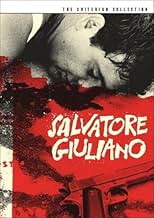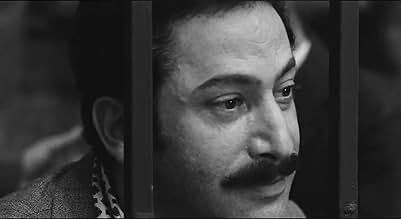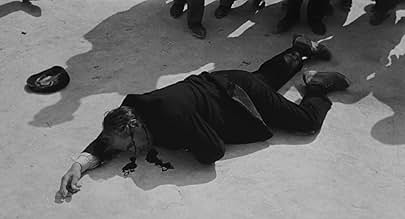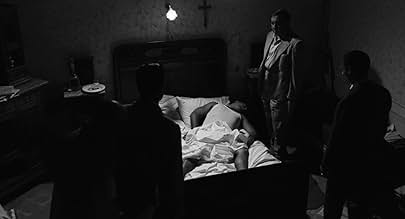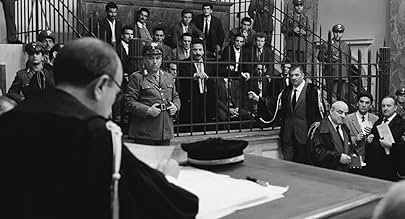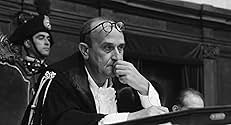IMDb RATING
7.3/10
5.2K
YOUR RATING
The unclear and complicated twists between governal powers, independentist party and Mafia in the Sicily of the '40s culminate with the death of Salvatore Giuliano.The unclear and complicated twists between governal powers, independentist party and Mafia in the Sicily of the '40s culminate with the death of Salvatore Giuliano.The unclear and complicated twists between governal powers, independentist party and Mafia in the Sicily of the '40s culminate with the death of Salvatore Giuliano.
- Awards
- 6 wins & 4 nominations total
Frederico Zardi
- Pisciotta's Defense Counsel
- (uncredited)
Pippo Agusta
- Minor Role
- (uncredited)
Sennuccio Benelli
- Reporter
- (uncredited)
Giuseppe Calandra
- Minor Official
- (uncredited)
Pietro Cammarata
- Salvatore Giuliano
- (uncredited)
Max Cartier
- Francesco
- (uncredited)
Nando Cicero
- Bandit
- (uncredited)
Pietro Franzone
- Seperatist
- (uncredited)
Giovanni Gallina
- Bit Part
- (uncredited)
Vincenzo Norvese
- Bit Part
- (uncredited)
Carmelo Oliviero
- Don Nitto Minasola
- (uncredited)
Renato Pinciroli
- Pinciroli
- (uncredited)
Francesco Rosi
- Narrator
- (voice)
- (uncredited)
Giuseppe Teti
- Priest of Montelepre
- (uncredited)
Cosimo Torino
- Frank Mannino
- (uncredited)
Featured reviews
Francesco Rosi's elliptical film about the notorious Sicilian gangster is quite stunning. This is not, however, a typical gangster film. This film is more about the lives of the people affected by Giuliano than about the gangster himself and this is given extra resonance by the casting of the real villagers in almost all cases. The fact that we never see Giuliano's face makes the director's intentions quite clear.
Giuliano began his professional criminal career when he was caught stealing at a young age and chased out of his village into the surrounding hills where he formed a gang and made a living from robberies and standover tactics. He became feared and respected by the locals and was eventually recruited by regional officials to help in the fight for independence from Italy. The first half of the film explores these events and manages to convey an extremely strong feeling for the time and place. The second half of the film deals with the trial of the surviving members of Giuliano's gang after his death and in doing so illuminates much of what has come before.
It is remarkable how well the film holds together considering the amount of different styles and techniques that were combined in its creation. There are elements of docudrama, courtroom drama, Italian neorealism, crime story and political tract. It is also surprising how well it holds up over forty years later.
Giuliano began his professional criminal career when he was caught stealing at a young age and chased out of his village into the surrounding hills where he formed a gang and made a living from robberies and standover tactics. He became feared and respected by the locals and was eventually recruited by regional officials to help in the fight for independence from Italy. The first half of the film explores these events and manages to convey an extremely strong feeling for the time and place. The second half of the film deals with the trial of the surviving members of Giuliano's gang after his death and in doing so illuminates much of what has come before.
It is remarkable how well the film holds together considering the amount of different styles and techniques that were combined in its creation. There are elements of docudrama, courtroom drama, Italian neorealism, crime story and political tract. It is also surprising how well it holds up over forty years later.
Review of Salvatore Giuliano (1962)
Directed by Francesco Rosi, Salvatore Giuliano (1962) is a gripping, politically charged Italian film that blends the genres of crime drama and historical reconstruction. The film portrays the life and death of Salvatore Giuliano, a real-life Sicilian bandit who became a legendary figure in post-war Italy. Giuliano's story is tragic, marked by his transformation from a rebellious hero to a notorious outlaw and his eventual murder under mysterious circumstances.
Rosi's approach to the material is unique. The film doesn't rely on a traditional narrative structure but instead unfolds in a fragmented, almost documentary-like fashion, presenting the story from various perspectives. This method of storytelling creates a sense of disorientation, mirroring the confusion and corruption of the political and social forces at play in post-WWII Sicily. By juxtaposing the personal tragedy of Giuliano with the larger political landscape of Italy, the film reveals the complex intersections between crime, politics, and the Sicilian mafia.
The performances are strong, with a particularly noteworthy portrayal of Giuliano by Marcello Mastroianni, whose quiet intensity brings depth to a character that is both a symbol of resistance and a product of the violent environment in which he lives. Rosi's direction maintains a cold, observational tone, which works well to emphasize the film's themes of disillusionment and betrayal.
Visually, the film is stunning, with cinematography that captures the stark beauty of the Sicilian landscape while also reflecting the harsh realities of life for the people caught in the web of organized crime and political corruption. The stark black-and-white visuals, coupled with the atmospheric score by Francesco De Masi, enhance the film's somber and tense mood.
Salvatore Giuliano is an excellent example of the political cinema that emerged in Italy during the post-neorealist era. It's not just a crime story; it's an exploration of the corruption and disillusionment that permeated Italian society during the 1940s and '50s. While the film might feel slow or fragmented at times, its depth and ambition make it a fascinating and insightful watch for those interested in the intersection of politics, history, and cinema.
Rating: 4/5 - A thought-provoking, well-crafted historical drama that shines a light on the murky intersection of crime and politics in post-war Sicily.
Directed by Francesco Rosi, Salvatore Giuliano (1962) is a gripping, politically charged Italian film that blends the genres of crime drama and historical reconstruction. The film portrays the life and death of Salvatore Giuliano, a real-life Sicilian bandit who became a legendary figure in post-war Italy. Giuliano's story is tragic, marked by his transformation from a rebellious hero to a notorious outlaw and his eventual murder under mysterious circumstances.
Rosi's approach to the material is unique. The film doesn't rely on a traditional narrative structure but instead unfolds in a fragmented, almost documentary-like fashion, presenting the story from various perspectives. This method of storytelling creates a sense of disorientation, mirroring the confusion and corruption of the political and social forces at play in post-WWII Sicily. By juxtaposing the personal tragedy of Giuliano with the larger political landscape of Italy, the film reveals the complex intersections between crime, politics, and the Sicilian mafia.
The performances are strong, with a particularly noteworthy portrayal of Giuliano by Marcello Mastroianni, whose quiet intensity brings depth to a character that is both a symbol of resistance and a product of the violent environment in which he lives. Rosi's direction maintains a cold, observational tone, which works well to emphasize the film's themes of disillusionment and betrayal.
Visually, the film is stunning, with cinematography that captures the stark beauty of the Sicilian landscape while also reflecting the harsh realities of life for the people caught in the web of organized crime and political corruption. The stark black-and-white visuals, coupled with the atmospheric score by Francesco De Masi, enhance the film's somber and tense mood.
Salvatore Giuliano is an excellent example of the political cinema that emerged in Italy during the post-neorealist era. It's not just a crime story; it's an exploration of the corruption and disillusionment that permeated Italian society during the 1940s and '50s. While the film might feel slow or fragmented at times, its depth and ambition make it a fascinating and insightful watch for those interested in the intersection of politics, history, and cinema.
Rating: 4/5 - A thought-provoking, well-crafted historical drama that shines a light on the murky intersection of crime and politics in post-war Sicily.
Filmed in the actual Siciilian locations, this film is a fair attempt to strip away the myth surrounding bandit-cum-revolutionary Giuliano. In fact, he doesn't appear except as a gunned-down corpse at the beginning. The film winds back to unravel the events leading to his death, and forwards to its consequence. This is a clever method of achieving objectivity while at the same time subtly emphasising the man's elusive and mysterious qualities. To show Giuliano would have either been either hagiography or iconoclasm. The film rose above that and broadened its inquiry into the wider social and political context, effectively belittling him as the puppet of various forces jostling for position in Sicily after the war: bandits, police, local aristocracy, the Italian government, communists, and the Mafia.
This sets quite a challenge for itself, partly because of the vacuum at its centre, partly because of the obscurity and complexity of the real events. We are delivered to a chaotic courtroom to try to piece it together. The film finally latches onto Giuliano's lieutenant the only one who seems to know something of what is going on - but even he is silenced. It's all the more disturbing for the confusion.
Rosi is one of the best directors of crowds scenes and he gives raucous energy to any gathering of men, especially in the courtroom. He induces a kind of group hysteria in his actors; they are totally unaware of the camera and the result is an almost disturbing hyper-real feel (real crowds are dull in comparison) it's really something to appreciate. To get into this film, you need to invest something in the passions of the various parties involved - if not sympathise with them, then at least understand them. Without this, the danger is that it all boils down to so much petty bickering. The same might be said of the Godfather, which clearly owes a huge debt to Rosi's style.
Influential then, somewhat brave, with some fine directorial moments, and an interesting history lesson. Hard to actually like, but hard not to admire.
This sets quite a challenge for itself, partly because of the vacuum at its centre, partly because of the obscurity and complexity of the real events. We are delivered to a chaotic courtroom to try to piece it together. The film finally latches onto Giuliano's lieutenant the only one who seems to know something of what is going on - but even he is silenced. It's all the more disturbing for the confusion.
Rosi is one of the best directors of crowds scenes and he gives raucous energy to any gathering of men, especially in the courtroom. He induces a kind of group hysteria in his actors; they are totally unaware of the camera and the result is an almost disturbing hyper-real feel (real crowds are dull in comparison) it's really something to appreciate. To get into this film, you need to invest something in the passions of the various parties involved - if not sympathise with them, then at least understand them. Without this, the danger is that it all boils down to so much petty bickering. The same might be said of the Godfather, which clearly owes a huge debt to Rosi's style.
Influential then, somewhat brave, with some fine directorial moments, and an interesting history lesson. Hard to actually like, but hard not to admire.
This remarkable movie reminded me of early Eisenstein for the fluid, dynamic
movement of crowds--in the streets, in the movement of soldiers and bandits across the hilly terrain, and in the scene of the Portella della Ginestre massacre. The back-and-forth narrative structure must have influenced Costa-Gavras in the making of "Z." And Rosi's ability to get riveting performances from non-professionals (some of whom could not read scripts) is astonishing. The story line gets confusing, but I think that's because the situation was confusing--multiple betrayals and layers of
corruption and complicity--rather than a flaw in the script or editing. Visually exciting, too--the use of distancing overhead shots, the quiet menace of gunmen walking up a deserted, sun-baked street... memorable stuff.
movement of crowds--in the streets, in the movement of soldiers and bandits across the hilly terrain, and in the scene of the Portella della Ginestre massacre. The back-and-forth narrative structure must have influenced Costa-Gavras in the making of "Z." And Rosi's ability to get riveting performances from non-professionals (some of whom could not read scripts) is astonishing. The story line gets confusing, but I think that's because the situation was confusing--multiple betrayals and layers of
corruption and complicity--rather than a flaw in the script or editing. Visually exciting, too--the use of distancing overhead shots, the quiet menace of gunmen walking up a deserted, sun-baked street... memorable stuff.
"Salvatore.." is more a documentary than a film, in which the story of the legendary sicilian gangster is told. Oddly enough, we never get to see his face, and no insight is given of his character or about how and why did he turn into such an icon for the sicilian people. We only know about him through the other characters in the film. Even though there is some fine acting going on, the direction of Mr.Rosi is downright awful. We are presented with a series of events with no connecting thread whatsoever, other than a logical chronological development. While dealing with an interesting historical moment of Sicily, the film is terribly boring and you need a truckload of patience to stay tuned through the end. If you are keen on studying Sicily's historical heritage, you may find this film interesting, if not, then you should miss it!.
Did you know
- TriviaMartin Scorsese credits this film as being one of his many inspirational sources for the look and style of his Taxi Driver (1976).
- GoofsWhen his mother comes to view and identify his corpse, Salvatore's stomach clearly moves as the actor struggles to control his breathing.
- ConnectionsEdited into Il sasso in bocca (1970)
- How long is Salvatore Giuliano?Powered by Alexa
Details
- Release date
- Country of origin
- Language
- Also known as
- Wer erschoß Salvatore G.?
- Filming locations
- 98 Via Serafino Mannone, Castelvetrano, Trapani, Sicily, Italy(Giuliano's body)
- Production companies
- See more company credits at IMDbPro
- Runtime2 hours 3 minutes
- Color
- Sound mix
- Aspect ratio
- 1.85 : 1
Contribute to this page
Suggest an edit or add missing content


